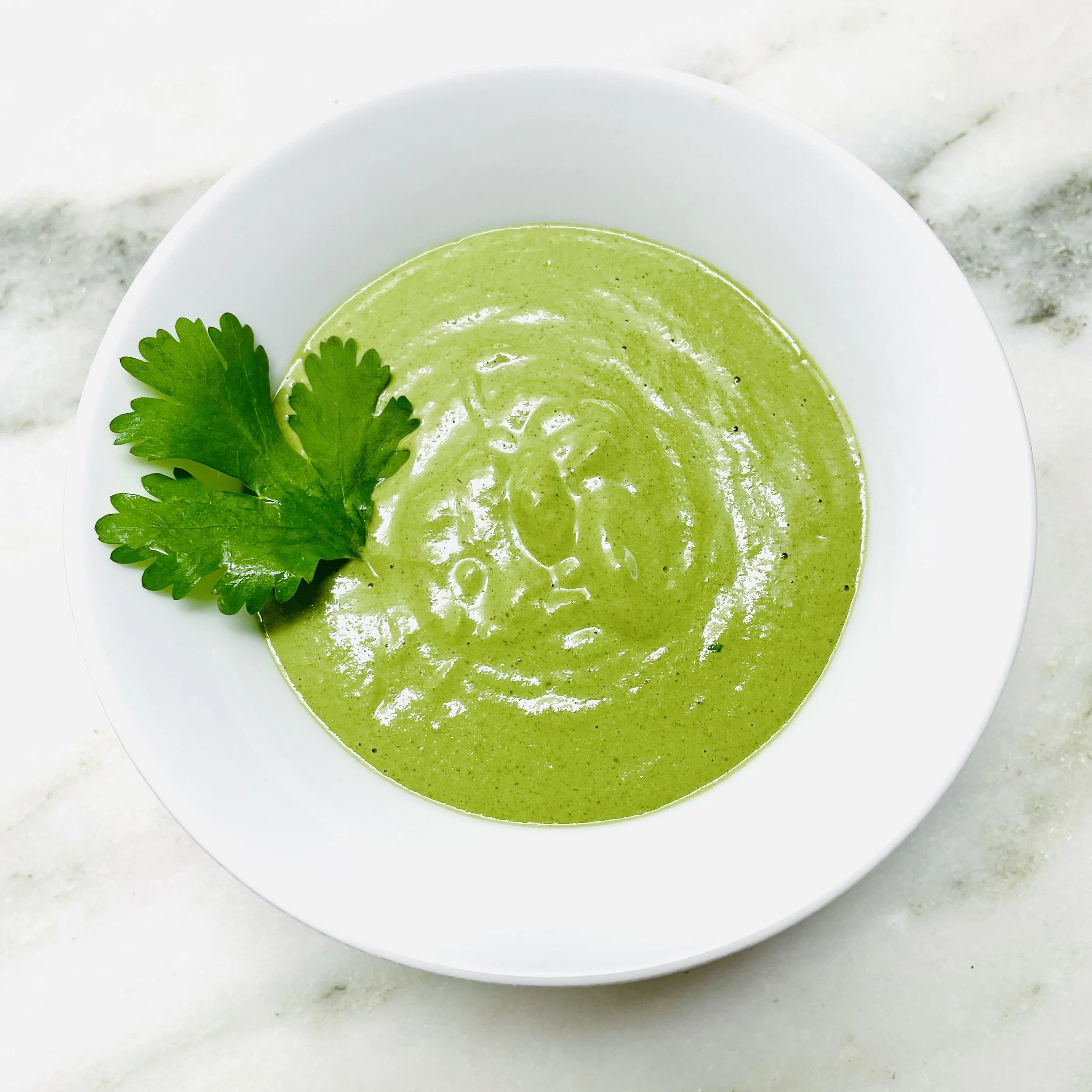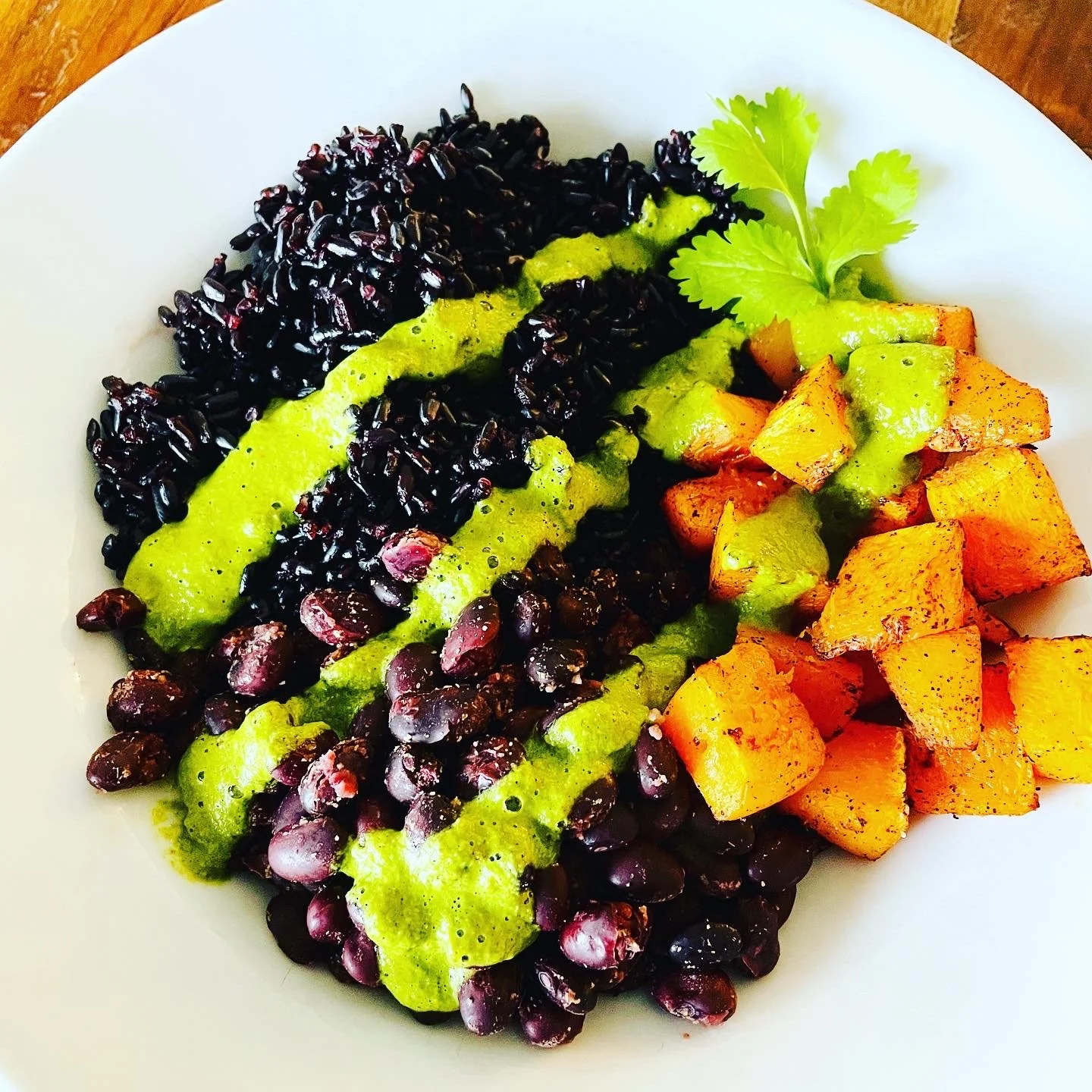Spicy Cilantro Sauce
Recipe by Danielle Lavallee
This spicy, herbaceous sauce is perfect over anything Mexican-inspired.
It is quick and easy to prepare, and it adds a delicious kick to burrito bowls, tacos, and fajitas.
Special Equipment Needed: High-Speed Blender
Ingredients:
1 large bunch cilantro, washed, stems included (less waste, no fuss)
1/3 cup raw walnut pieces
2 tablespoons hemp hearts
2 tablespoons ground flax seeds
The juice of 3 limes
1-2 jalapenos, roughly chopped, seeds included
(Start with one and test how spicy it is before adding a second.)1 teaspoon cumin
1 tablespoon tamari or soy sauce (optional)
1/2 teaspoon salt, or more to taste
1/2 cup water
Method:
Place all ingredients into the bowl of a high speed blender, adding only one jalapeño pepper to start.
Blend on medium-high.
If difficult to blend, add water a tablespoon at a time until the sauce is smooth and creamy.
Taste and adjust your seasonings, adding the second pepper and additional salt, if desired.
This sauce is delicious on nourish bowls like this black rice and black bean bowl with chipotle-rubbed butternut…
on tacos, like these fajita-style portobello tacos with cabbage, peppers, and avocado…
on burrito bowls, like this Oaxacan bowl with red cabbage slaw, sweet potatoes, and candied pecans…
and on breakfast bowls, like this hash with black rice, corn, and roasted veggies.
Not only is this sauce super flavorful and delicious on anything needing a spicy, herbaceous kick, but it is packed with Omega-3 fats, which are critical for brain and heart health. These polyunsaturated fats (PUFAs) are brain-boosters, stimulating the brain to produce important nerve grown factors that promote neuroplasticity. Omega-3 fats have also been implicated in regulating and reducing inflammation levels in the brain by lowering the concentration of pro-inflammatory molecules. Studies have also found that they decrease blood triglycerides, improve heart health, and they even reduce the risk of dementia. By contrast, low levels of Omega-3 PUFAs have been consistently associated with depression. Given the critical roll Omega-3 fats play for our brain and physical health, it is important to try to find ways to incorporate them into our daily diets. (Liao, 2019; Rajaram, 2014; Siriwardhana et al., 2012; Yanai, 2017)
This Spicy Cilantro Sauce is one of my favorite ways to up my consumption of Omega-3 fats. It contains several of the best plant-based sources of Omega-3 fats, including walnuts, flaxseeds, and hemp hearts. As an added bonus, the Vitamin C from the limes increases the non-heme iron absorption from the other plant foods in the meal, and the cilantro, peppers, and cumin contribute fantastic flavor, antioxidants, and Vitamin K. This sauce is delicious, and equally importantly, it is fabulous for our brain and heart health.
Hands on Time: 15 minutes
Total Cook Time: 15 minutes
Yield: 1 cup of sauce total = eight 2-tablespoon servings
Nutrition Information Per 2-tablespoon serving:
Calories: 81 Protein: 3g Fat: 6.3g Carbs: 2.9g Fiber: 1.5g Iron: .9mg
Calcium: 23.7mg Vitamin A: 23.3IU Vitamin C: 13.8mg Folate: 13.1IU
Potassium: 104.1mg Polyunsaturated Fat: 4.5g Saturated Fat: .6g
Trans Fat: 0g Cholesterol: 0mg
Wishing you excellent health and happy eating!
🌱
References:
Liao, Y., Xie, B., Zhang, H., He, Q., Guo, L., Subramanieapillai, M., Fan, B., Lu, C., & McIntyre, R. S. (2019). Efficacy of omega-3 PUFAs in depression: A meta-analysis. Translational Psychiatry, 9(1), 190. www.doi.org/10.1038/s41398-019-0515-5
Rajaram S. (2014). Health benefits of plant-derived α-linolenic acid. The American Journal of Clinical Nutrition, 100 Suppl 1, 443S–8S. www.doi.org/10.3945/ajcn.113.071514
Siriwardhana, N., Kalupahana, N. S., & Moustaid-Moussa, N. (2012). Health benefits of n-3 polyunsaturated fatty acids: eicosapentaenoic acid and docosahexaenoic acid. Advances in Food and Nutrition research, 65, 211–222. www.doi.org/10.1016/B978-0-12-416003-3.00013-5
Yanai H. (2017). Effects of N-3 Polyunsaturated Fatty Acids on Dementia. Journal of Clinical Medicine Research, 9(1), 1–9. www.doi.org/10.14740/jocmr2815w








